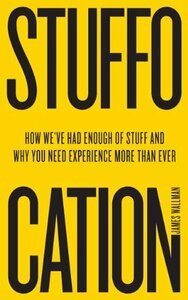You need to sign in or sign up before continuing.
Take a photo of a barcode or cover
Since being introduced to Joshua Fields Millburn and Ryan Nicodemus - The Minimalists via their book [b:Minimalism: Live a Meaningful Life|13185350|Minimalism Live a Meaningful Life|Joshua Fields Millburn|https://d.gr-assets.com/books/1329640817s/13185350.jpg|18366045] and blog a little over a year ago, I've had a growing interest in the idea of minimalism as well as a growing awareness of my own hoarder-esque tendencies.
However after reading Minimalism I was left a little underwhelmed. Although it had a positive message at it's core, it's all delivered through the personal anecdotes and smug philosophies of the authors. Rather than the useful, informative guide to minimalism that I hoped for, it presents very little of the practicalities of minimalism, and basically serves as a personal pseudo-motivational manifesto of the two authors. Many of the chapters are simply essays from their blog copied across verbatim (and without spell-checking apparently). There is a lot of positive, interesting and challenging stuff in the book, you just have to sift through a lot of wank to find it.
So given my disappointment with Minimalism, when I began reading James Wallman's Stuffocation I was a little concerned to find that the introduction begins with the very same story that Fields Millburn and Nicodemus tell in the first chapter of their book. It's the story of how Fields Millburn, dissatisfied with his successful career and material wealth, conducted a drastic experiment to box up and get rid of every material possession apart from the few things he used within a three week period - the bare minimum.
It's an understandable opening for both books, it's an inspirational story - albeit not a very practical one for most people - and a perfect example to represent the shift in values away from materialism that Wallman describes over the course of the book. Fortunately that's where the books' similarities end.
Unlike the minimalists, Wallman offers an in depth, and exhaustively researched analysis of the problems emerging from western material culture, from a global scale, down to the individual. He uses the puntastic title as a short-hand for these problems: the economic and environmental stress, and even damage to our physical health and safety caused by having too much stuff.
To explain Stuffocation, Wallman draws from case studies and personal stories such as that of Fields Millburn and other minimalist/experientialist bloggers, as well as solid scientific, economical and statistical data.
Not only that, he offers solutions - a variety of practical ideas that the reader can choose to implement; as well as a more societal solution, or rather a prediction of where society is already heading in response to these problems.
The result is a book that is part self-help, and part documentary.
Despite the myriad academic references Wallman draws from, the book is very readable, and doesn't struggle to hold your interest. It's a positive and optimistic look at the potentially smothering problem of Stuffocation. As a self-confessed hoarder, I highly recommend you buy it. In fact, buy a thousand.
However after reading Minimalism I was left a little underwhelmed. Although it had a positive message at it's core, it's all delivered through the personal anecdotes and smug philosophies of the authors. Rather than the useful, informative guide to minimalism that I hoped for, it presents very little of the practicalities of minimalism, and basically serves as a personal pseudo-motivational manifesto of the two authors. Many of the chapters are simply essays from their blog copied across verbatim (and without spell-checking apparently). There is a lot of positive, interesting and challenging stuff in the book, you just have to sift through a lot of wank to find it.
So given my disappointment with Minimalism, when I began reading James Wallman's Stuffocation I was a little concerned to find that the introduction begins with the very same story that Fields Millburn and Nicodemus tell in the first chapter of their book. It's the story of how Fields Millburn, dissatisfied with his successful career and material wealth, conducted a drastic experiment to box up and get rid of every material possession apart from the few things he used within a three week period - the bare minimum.
It's an understandable opening for both books, it's an inspirational story - albeit not a very practical one for most people - and a perfect example to represent the shift in values away from materialism that Wallman describes over the course of the book. Fortunately that's where the books' similarities end.
Unlike the minimalists, Wallman offers an in depth, and exhaustively researched analysis of the problems emerging from western material culture, from a global scale, down to the individual. He uses the puntastic title as a short-hand for these problems: the economic and environmental stress, and even damage to our physical health and safety caused by having too much stuff.
To explain Stuffocation, Wallman draws from case studies and personal stories such as that of Fields Millburn and other minimalist/experientialist bloggers, as well as solid scientific, economical and statistical data.
Not only that, he offers solutions - a variety of practical ideas that the reader can choose to implement; as well as a more societal solution, or rather a prediction of where society is already heading in response to these problems.
The result is a book that is part self-help, and part documentary.
Despite the myriad academic references Wallman draws from, the book is very readable, and doesn't struggle to hold your interest. It's a positive and optimistic look at the potentially smothering problem of Stuffocation. As a self-confessed hoarder, I highly recommend you buy it. In fact, buy a thousand.
Interesting attempt at summarising 'evidence' on stripping back possessions and its purported benefits, but this could have been the length of a long essay rather than the 350 pages it ended up as. Topics only tangentially related to the title delved into with zeal, but bringing nothing to the experience.
A quick read with some excellent points about our cultural obsession with possessions. Also some good points about the coming shift in worldwide materialism/resource demands with the rise of consumption in Asia.
I liked this, but I think it was a little too hyped-up for me, because I didn't love it quite as much as I expected to.
Still, there were tons of parts I read aloud to Bart or found myself thinking about in new ways. Definitely worth a read.
Still, there were tons of parts I read aloud to Bart or found myself thinking about in new ways. Definitely worth a read.
This book by a trend forecaster and journalist was interesting. The author discusses how some people are pushing back against our materialistic society that values stuff. After providing a history of how we became so materialistic (which I mostly skimmed), he considers the voluntary simplicity and minimalism movements as antidotes, but rejects these as not having widespread appeal. He then talks about a concept called "medium chill" which is an approach seeking more work/life balance. For example, if offered a job promotion with more money, some are saying no to climbing the ladder when it means giving up family time, etc. The book promotes the concept of experientialism, valuing experiences over things, and the author cites various studies that people derive more happiness from experiences, e.g., travel, eating restaurant meals, spending time in nature, etc. than from possessions. He talks about how experientialism can be aspirational if people seek out experiences to impress friends, e.g., on Facebook, and cautions against this new form of keeping up with the Joneses. He talks about how the sharing economy can contribute to experientialism, e.g., renting things rather than owning them. Also, some things can also be experiential, such as buying a book to read and enjoy it, purchasing sporting equipment to facilitate hobbies, etc. He talks about some experientialists who try to have few possessions, but purchase the best they can (saying this is one way experientialists still bolster the economy). He talks about trends such as smaller homes, renting rather than owning cars or using services like Zipcar, and that work is evolving with many people being able to work anywhere with a laptop and Internet connection, providing enjoyable experiences while earning a livelihood. He states that many people today are more interested in finding meaning and self-expression rather than just acquiring stuff, so experientialism can fulfill these goals ("meaning is the new money").
informative
inspiring
reflective
medium-paced
3 stars because 2.5 felt too mean. There is good stuff in this book, and having read it I have a strong feeling that the author is a super nice and well-meaning fellow. However, the problem with 'Stuffocation' is too huge and indeed too ironic too ignore: it is absolutely chock-full of waffle and tautologies. Had it been condensed down to half - heck, maybe even a quarter - of its length, it could have been a 4 or 5 star suckerpunch. As it is, you are so overwordened (I made up my own word too) by superflous goings-round-in-circles that by about halfway through you want to scream, and feel really bad about that because the book has such honourable intentions. But seriously, some points were made so many times I literally lost count, and I have to wonder if this was an attempt to obfuscate the fact that, in the end, 'Stuffocation' didn't have a lot of answers, unless you're rich and sold on the idea of 'experientialism', of which I am neither. The book brought together a lot of cool stats, case stories and other information, but ultimately did little with them. Which is fine, I suppose, but not at such length. I'm sure there are better books out there on the subject. Sorry, Mr Wallman.
It's interesting how STUFF has a negative impact on my life & mood.
Really enjoyed this but did expect better when i heard about it initially.
Really enjoyed this but did expect better when i heard about it initially.




